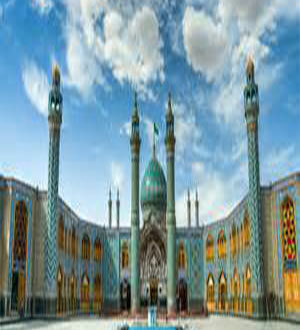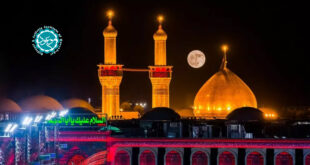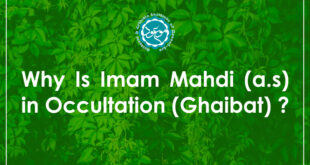Fifth Imam (a.s.)
Imam Muhammad al-Baqir (a.s.) was born on third day of the Month Safar in the year 75 AH in Medina. His father was Imam Ali ibn al-Husain (a.s.) and his mother was Fatimah, the daughter of Imam al-Hasan Mujataba (a.s.). Imam al-Sajjad with God’s command appointed Imam al-Baqir (a.s.) to the Caliphate and Imamate.11
His education and knowledge was so much that he was titled as the one who reaches the depth of knowledge (Baqir al-Uloom). The great scholars recognized his intellectual position and were humbled in front of him and respected him in a manner like that of a school child who sits respectfully before his teacher; they asked their problems from him and received sufficient answers.
For Imam al-Baqir (a.s.) an opportunity arose that was not provided to all of his predecessors. Due to internal conflicts and confrontations of the caliphs, he had relatively more freedom and seriously endeavored in the publication of Islamic learning, religious commandments and laws, and left thousands of educational contexts and narrations as his legacy.
Imam al-Baqir (a.s.) lived in this world fifty-seven years and was martyred on the seventh day of the Month of Dhu al-Hijja in the year of 114 AH, and was buried in the Baq’i Cemetery. Imam al-Baqir (a.s.) loved agriculture and worked hard to earn his livelihood. Muhammad ibn Mankader said: “On a very hot day I met Imam al-Baqir (a.s.) in the vicinity of Medina, I saw that he had gone out for agricultural affairs and sweat was dripping from his body.
He said to himself that: ‘For an honorable and exalted person like Imam al-Baqir (a.s.) who is an offspring of the Holy Prophet (S), it is not decent to come out of his home in this heat, I better admonish him. I went near him and offered salutations upon him, while taking deep breaths and while his sweat was dripping he answered my salutations. I said: ‘O Son of the Holy Prophet (S)! Is it not insulting that at such a time you are busy in seeking the world? If your death arrives right now what would you do?
That honorable one rested his back against some support and said: ‘If my death arrives right at this time, I would die in the state of worshipping; because I am working so that I do not stretch my hand from begging near you or other people. If I am in a state of sinning against God, then in that case I must be scared from death.’ I said: ‘O the Son of the Holy Prophet (S), I wanted to admonish you but I become admonished from your words.’”12
Sixth Imam (a.s.)
Imam Ja’far al-Sadiq (a.s.) was born on seventeenth day of the Month of Rab’i al-Awwal, in the year 83 AH. His father was Imam Muhammad al-Baqir (a.s.) and his mother was Umme Farwah, the daughter, of Qasim ibn Muhammad ibn Abu Bakr. Imam al-Baqir (a.s.) with the command of God appointed Imam Ja’far al-Sadiq (a.s.) for the position of Caliphate and Imamate.13
During Imam al- Sadiq’s (a.s.) period the confrontation between Banu Umayyah and the Abbasids had intensified significantly and as a result the power of the current government was rather weak. Banu Abbas too, in their opposition with Banu Umayyah, supported Ahl al-Bayt (a.s.). Imam al-Sadiq (a.s.), utilized this opportunity and endeavored in education of religious learning and publication of commandments and laws; through organizing educational assemblies, he nourished distinguished pupils and intellectuals; and succeeded in introducing education of issues relevant to legitimate (halal) and illegitimate (har’am) among the people.
Approximately four thousands14 pupils were trained in the School of Imam al-Sadiq (a.s.); books consisting of precious treasurers were written from traditions.
Due to this reason the Shi’a School of Thought is called as the Ja’fari School of Thought. Imam al-Sadiq (a.s.) lived in this world for a period of 65 years and was martyred in the Holy City of Medina in middle of the Month of Raj’ab or twenty-fifth of the Month of Shawwal in the year 148 AH and was buried in the Baq’i Cemetery.
Seventh Imam (a.s.)
The seventh Imam Musa ibn Ja’far al-Kazim (a.s.) was born on seventh of the Month of Safar in the year 128 AH in Abw’a that has been located in between Mecca and Medina. His father was Imam al- Sadiq (a.s.) and his mother was Hamideh. Imam al-Sadiq (a.s.) with the Command of God, appointed his son Musa to Caliphate and Imamate. His worshipping and piety was to the extent that he was called Righteous Servant (Abd Saleh); he was very mature and compassionate and never lost his temper while encountering severe hardships, and due to this reason he was called repressor of anger (al-Kazim).
In spite of the fact that the Imam (a.s.) lived in a very difficult period, there was no opportunity for the publication of narration, even then, plenty of people acquired knowledge from his presence and plenty of narrations have been left from him.
He lived in this world for 55 years; in the year 179 AH, Caliph Harun ordered that he should be taken from Medina to Iraq. He was imprisoned for years in Baghdad and Basra and ultimately was poisoned and martyred on twenty-fifth of the Month of Rajab in the year 183 AH. He was martyred in prison of Sindi ibn Sh’ahak in Bagdad and was buried in the Holy City of Kazmain.
A man in Medina continuously bothered Imam al-Kazim (a.s.) and cursed Imam Ali ibn Abu Talib (a.s.); some of companions of the Imam (a.s.) said: “Please permit us to kill this wicked person, he refused them to do that and instead asked them where that person was?’ They replied: ‘He is busy in agriculture in the vicinity of Medina.’ Imam (a.s.) started moving in the direction of his agriculture farm; he reached near him, sat near him, with a smiling and pleasant face asked him: ‘How much have you spent on this farming?’ He replied one hundred dinars.’ He asked: ‘How do you expect your return?’
He replied: ‘Two hundred dinars.’ He asked how much do you want to earn from it.’He replied: ‘Two hundred dinars.’ Then Imam (a.s.) gave him a sack containing three hundred dinars and said to him: ‘The product of this farming also belongs to you.’ That man who saw such sort of benevolence against his annoying of Imam (a.s.), stood from his place and kissed Imam’s (a.s.) forehead and asked pardon from his previous insults; Imam (a.s.) pardoned him and returned towards Medina. The next day they saw that man in the mosque, and his eyes fell upon Musa ibn Ja’far (a.s.) he said: ‘God knows better where to place His Prophethood and Imamate. The people were amazed and wanted to find out the reason of change in his behavior, that man started talking about the virtues and distinctions of Imam Musa ibn Ja’far. Then Imam Musa ibn Ja’far (a.s.) said to his companions: ‘Was this act better than your decision? Through the means of an insignificant amount of money I have removed his evil and have changed him into a friend of Ahl al-Bayt (a.s.).”15
Eighth Imam (a.s.)
Imam Al-Ridha’ (a.s.) was born on the eleventh day of the Month of Dhu al-Q’ada in the year of 148 AH. His name was Ali, his father was Imam Musa ibn Ja’far (a.s.) and his mother’s name was Najmah. With God’s Command Imam Musa ibn Ja’far (a.s.) appointed his son Ali to Caliphate and Imamate.16
The knowledge and learning of Imam Al-Ridha’ (a.s.) was superior with respect to all of the people of that period. Students for acquiring knowledge came to his threshold and utilized from his presence; a large number of narrations about Islamic learning and religious laws and commandments have remained as his legacy. He had very interesting debates and arguments with the scholars of other religions. He participated in the debate assemblies and answered criticisms of all, and was not helpless in answering about each issue whatsoever.
His vast learning and knowledge made the people present amazed and causing them to offer him praise and compliments; he was regarded among the people extremely honorable, and was called as Scholar of Holy Progeny of the Holy Prophet (S). Caliph Mamun al-Rashid in the year of 200 AH called Imam Al-Ridha’ (a.s.) from Medina to Marv, located in the Khorasan Province of Iran.
When Imam Al-Ridha’ (a.s.) entered into Marv, Mamun suggested that Imam (a.s.) should accept the Caliphate, but he didn’t accept; with a great deal of insistence he suggested that he should accept becoming the successor! He, with this act, had two intentions:
1. He wanted, by appointing Imam Al-Ridha’ (a.s.) as successor, to acquire a religious and spiritual pretense in order to attract the attention of Shi’a and Alawite S’adat towards him and through this means, make him at ease from their opposition and rebellion.
2. He wanted Imam Al-Ridha’ (a.s.) to accept becoming his successor to become close to the Institution of Caliphate and become involved in the affairs of the country and through this means sacrifice his prestige and dignity to lessen Shi’a inclination, attachment toward him.
Imam Al-Ridha’ (a.s.) was well-informed with respect to Mamun’s intentions and knew that: Someone, in order to secure his caliphate, does not even hesitate to kill his own brother; it is not possible that with pure intentions, he would offer caliphate or the position of successor to someone else; however due to these illegitimate reasons he refused to accept becoming his successor, but with the intense pressure of Mamun, he had no other option except to accept it. However, he did so with the condition that he would not interfere in affairs of the country and in appointments and terminations of the rulers. Later on Mamun realized that Imam Al-Ridha’ (a.s.) had not given up his honor and dignity, instead, the inclination and attachment of the people with respect to the Imam was increasing day by day. It was due to this reason that he decided to kill him.
Imam Al-Ridha’ (a.s.) lived in this world for 55 years then he was poisoned through Mamun and in the last Month of Safar in year 303 AH, was martyred in Tus and was buried in the same place which is now called the Holy City of Mashhad.

 Mouood Mouood English Edition
Mouood Mouood English Edition



